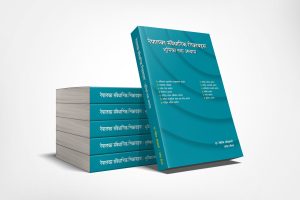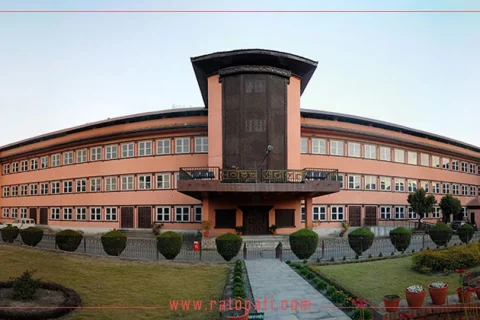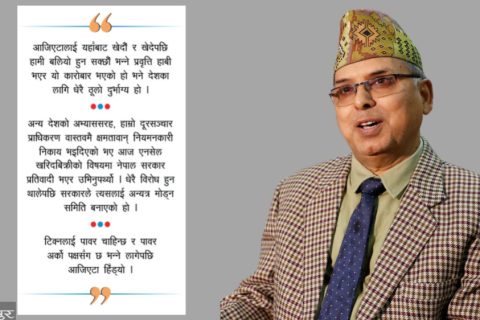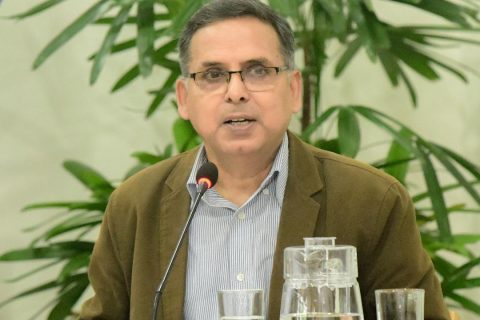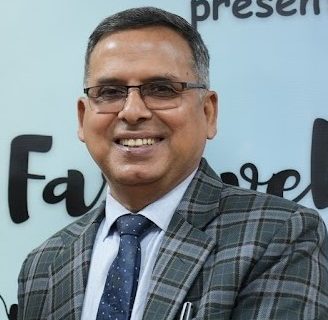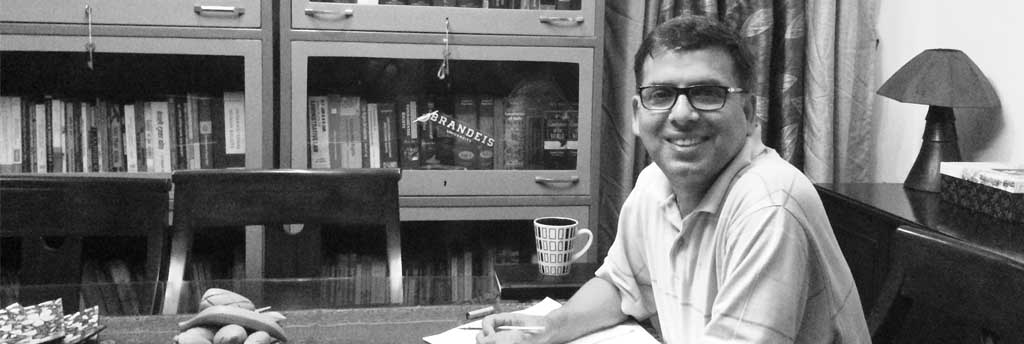
The Constitution of the Kingdom of Nepal, 1990, has now completed its 15th year. The last three years of its life have been very dreadful. It is being victimised by its own associates and well-wishers. The worst – it continues to face the visible retreat of ideology from public life and the corresponding transparency of the quest for power as an end in itself. The malaise is serious enough to merit consideration beyond the ambit of partisan politics.
The context here is not only the Constitution, but also a strange violent-conflict afoot in Nepal, which has neither ceased to be serious to the parties concerned because more than 12,000 people have already died due to this, nor has ceased to be funny because it is doing exactly the opposite of what it intended to do.
Reviving the Constitution
The Communist Party of Nepal (Maoist), which demands formation of an interim government, elections for a constituent assembly, and drafting of a new constitution, and the illegitimate government, which has been an all-time liability to the nation, both want to write off the 1990 Constitution for no fault of its own. Prachanda, the Maoists’ chief, declared his intention long back, and Tulsi Giri, who is counted as the number two in the royal cabinet, briefed the people about it only after the eighth month of the seizure of the state power by the king. A somewhat anarchic vision of building everything anew pervades the dream of both these groups. The result is the most sordid display of opportunism and venality in their slogans, basically manufactured for public consumption. Hypocrisy is on the rise, but guilt has never been allayed.
What is so bad in the Constitution for both these parties to the ongoing conflict is nevertheless clear. They do not want any restraint on their power. The hurdle for both these parties is the 1990 Constitution, which for the first time in Nepal’s written history declared that the people of this country are sovereign, assured that fundamental human rights are guaranteed to all, created an independent judiciary, and enforced a parliamentary system of government based on adult franchise. It is this Constitution, which guaranteed the people of Nepal the most cherished values of modern societies: freedom of speech, representative form of the government, and liberal institutions of governance. It is this Constitution, which gave the people of Nepal an opportunity to assert their independence through their representative institutions, and enabled them to become far more international in their outlook and aspirations, more sophisticated and liberal in their economy, lifestyle and attitudes, and certainly more demanding in terms of their desire for self-governance.
The first group took arms against the Constitution lacking the numerical strength to win the parliamentary elections to achieve a totalitarian communist system from the position of power. And the second entered into the scenario because the first group was able to give it an opportunity to assume unbridled power as a response to the bloody insurgency. Additionally, it was also not possible for it to remain untouched when the chassis of the nation including the monarchy itself was being attacked by forces having no public approbation. For both of them, the only way out was to dispense with the present Constitution, which came on the way of their ambitions and counter-ambitions. Both of them are still struggling to frame their assault on the Constitution in a way that will evince patience. The explanation sounds surreal because truth is stranger than fiction.
Surprisingly, most of the mainstream political forces, which were crucial for the enactment and promulgation of the present Constitution in 1990, too, have lost their fantasy with it. The people of Nepal, who have lost their voting rights since the last three years, still want to know why the Constitution is being victimized, and why they are bickering around as the birds of passage, bereft of any principle and commitment. They never explained why the innocence of this Constitution is in doubt, and why it cannot be reformed the way most of the living constitutions of the world were reformed and modernized to suit the changing requirements of the time. Unfortunately, by opting for election for a constituent assembly, and drafting of a new Constitution, this lot, particularly the Nepali Congress (NC) and the UML, not only surrendered their commitment to a living Constitution, but also betrayed the legitimate constitutional process of change. Going beyond the anger and ironies, wrapping them around twenty-four hours, have they ever thought why they could not ever work out a working arrangement with the King? The loyal opposition has become frantically disloyal, and have instead chosen to lend hands to the Maoists in order to speed up an openly anti-democratic insurrection. It is difficult to overstate how radical this view is, and how out of line it is with the sustainable process of change.
Democratic Reconciliation
Moral losses that we see in our parties are like radiation – colorless, odorless and terrifying. After every move, they need to go across the international border, get the feed back and reinvigorate their commitment in the war against the Constitution. This Constitution sustains the King, and the King sustains Nepal’s political independence. So democracy is not an issue; the issue which must be confronted is monarchy, and the Constitution which sustains it. The demand for a constituent assembly, which comes out of sudden in this perspective does not seem to be homegrown. The free and independent media is indeed able to make illusions appear real, especially for those who are already out of touch with reality. They are talking about solution without knowing the nature of the problem.
The Nepali Congress, in particular, has become a funny case in point. This oldest democratic party of Nepal did not hesitate to give a deadly blow to its long established policy of national reconciliation in order to defeat what B P Koirala described as threats to the independence of the nation and its political sovereignty. The NC ignored that the challenge before the democrats is not only to take the responsibility of restoring democracy but also safeguarding the nation, which is being pushed to a bargaining table to negotiate its nationhood. While the democrats in the Congress, and those in the seven party alliances, do not care that there are other dangers to democracy more than monarchy, the king has also belittled the reality that there are dangers to monarchy more serious than parliamentary democracy, the political parties and the Maoists. No efforts were made to reform their weaknesses to reconcile with the King, and work out a moderate strategy that should have enabled the Maoists to join the mainstream minimizing their disastrous potential to a great extent.
The dilemma of the isolated king, who wields power to an unhealthy extent cornering the legitimate political forces, is self-evident. He is in office but not in power. The power is being exercised by some unscrupulous people, who hardly understand the complication that the King has created for himself, and for the nation. He probably knows where the fault-lines are, but his authoritarian patterns come on his way. Knowing how to swing a golf club is one thing, but doing it correctly every time is another. The risk factor is crucial because the king who was crowned just a few years ago had no opportunity to grow with representative institutions. His first mistake was the event of October 4, 2002 that symbolized his impatience with democratic process. The second mistake was the occurrence of February 1, 2005, a serious distrust for the representative political system, which helped tarnish his democratic image seriously.
The country remains unattended in this critical juncture of its life. The involvement of a foreign country in the seven party movements has already contaminated the atmosphere. Moreover, these movements, especially their recent moorings about jointly working with the Maoists, is an intellectual tragedy– a tragedy of idealism, ignorance and mimicry. A communist movement resulting in a democracy (or “full democracy” as they describe it) is a self-deception as old as the Bolshevik revolution. The comment is not on the democratic programs of the Maoists per se, but on the fringe outcomes, which are inevitable in their process. In fact, a king who does not hesitate to point out about the use of massive foreign money to achieve unwanted activities in the capital needs to know precisely how to counter the whole situation. The existence of the foreign element is not unique to Nepal. What is unique in recent years, however, is its size and aggressive techniques. The King needs the strength of the whole country, of the institution of democracy and of ordinary people, in building the nation. An isolated king is not only a risk to the independence of the country but also its sovereign capacity.
The silent majority of Nepal still believes in the value system of the past – to stand by the King when the chips are down. This is what the first elected Prime Minister, B. P. Koirala, did. However, much to the bewilderment of all, in this critical period, how can the common people believe that the country and its Constitution are safe in the hands of the king, whose half of the ministers are of dubious character? His recent moves including the imposition of the censorship law are not just error of judgment, but monumental blunders of an able man. Is it not enough to know that while the King still talks about democracy his ministers talk about scrapping the Constitution, and devising a new model of democracy that suits the genius of Nepali people? Why is this Constitution being victimised if democracy is the mission of this country? Funny or serious, if all political institutions in the country are overwhelmingly penetrated and moved by forces antithetical to human rights, democratic Nepal and its sovereign interests, is the ongoing conflict really a manifestation of an impulse towards political reform, or is it something else?
Logic of Elections
There is no reason why election should be boycotted. It is always a democratic institution. Even if an election is being held by an illegitimate government, it is wise for those who consider themselves as legitimate representatives of the people to participate in it. There are very good reasons why the need for holding elections must be insisted by all as the doorsill requirement to deal with the problems caused by the ongoing conflict. The first thing these elections will do is the reinstallation of representative institutions and give a fresh mandate to those who can represent the common people to resolve the Maoist conflict. With the election for the House of Representatives, the Constitution will revive itself with full force, and the jurisprudence of power and restraints, and the rules of checks and balances will quickly start circumscribing Article 127 and its misuse by the King. The parliamentary and deliberative processes inherent in the Constitution will then create fresh impetus in all components of the power grid to move forward with national determination. This is the only way the King can be stripped off his newly acquired powers, and the democratic process and the political parties can again be empowered and pressed hard to create options for the Communist Party of Nepal (Maoist).
While elections are a must, they can furnish the desired result only if all political parties and the Maoists participate, and the preconditions for ensuring the sanctity of the electoral process are fully met. In particular, the participation of Maoists in the elections can also serve as a proof of the fact that they are democratizing, and trying to renounce violence as a means to achieve political ends. Their participation in elections does not mean giving up their political demands. They can work out a common strategy with the parties in advance, and express commitment to the electoral politics as the process of change.
Even if they decide not to participate for strategic reasons, they can still help these elections as they will be creating their legitimate counterpart in the peace process. It must have been clear to the Maoists by now that their historic demand of talking with the King straight (after destroying the political process and parliamentary institutions) has been the most unfortunate one for all. They not only helped pull down a democratic Constitution, but also the political parties, who still represent a majority of the Nepali people.
Elections can also bring a period of enthusiasm and euphoria, of resurrection of democratic commitment and can open the options for the common people in the street. Many among the common people are unlikely to be much impressed by the cease-fire and political rhetoric, much less by the kind of antics resorted to by the Maoists in the past. If democracy, as the Maoists also claim, is the solution to the political problems that Nepal is facing, and if this is what their mission is, then it needs to be explained why they have been arguing about using democracy as the stepping stone to achieve a communist republic. This is the stumbling block, which comes on the way of peace negotiation between parliamentary political parties and the Maoists, and shows the gulf between them in their basic approach to the organization of state power. From a political, institutional and cultural point of view, what this message means is that democracy is only a transitory requirement, and the determination to instigate steps, as and when they are feasible, to achieve totalitarian objectives are already on the agenda.
End of Fanaticism
After all, the independent critical mass of this country has not forgotten how the Maoists declared war against parliamentary democracy when it had already started delivering its promises. The atmosphere of secrecy and disinformation, which are consistently dished out by Maoists for strategic purposes explain for themselves without any hitch. In the absence of clarity of purpose and strategy, the seven parties also look fragile, vulnerable to outside maneuverings, and indeed facing the legitimacy crisis from within. Despite the efforts of all parliamentary parties combined, and the goodwill of the international community, they are not successful to appeal to the political senses of the new generation. It needs to be pointed out in the same vein that the King of Nepal might have lost a part of his credibility; he has not lost his appeal. This all shows that there is an urgent need to sit together and turn the ossified political scenario into creative one.
In fact as Winston Churchill said, those leaders are fanatic who can’t change their mind and won’t change the subject as well. This attitude cannot help transform the nature of the ongoing conflict in Nepal. In war as in life, it is often necessary when some cherished scheme has failed, to take up the best alternative open, and if so, it is folly not to work for it with all available strengths. Elections can be a point of departure, and the revival of the constitutional process can give a basis for optimism. The Constitution of the Kingdom of Nepal continues to plead what is inherent in the famous quote – “God save me from my friends – I can protect myself from my enemies.”



